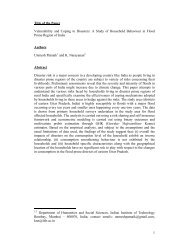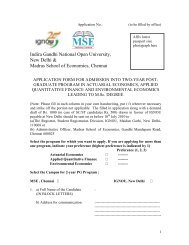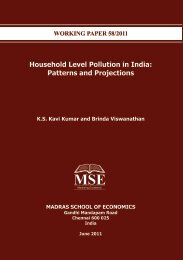Science and Economics for Sustainable Development of India
Science and Economics for Sustainable Development of India
Science and Economics for Sustainable Development of India
You also want an ePaper? Increase the reach of your titles
YUMPU automatically turns print PDFs into web optimized ePapers that Google loves.
under the prevailing pollution control regime <strong>and</strong> as the administrativecapacity exists <strong>for</strong> levying <strong>and</strong> collecting the taxes with the tax authoritiesin <strong>India</strong>, the Ministry <strong>of</strong> Environment <strong>and</strong> Forests asked Madras School <strong>of</strong><strong>Economics</strong> to recommend eco taxes <strong>for</strong> consideration by the government.Chelliah, et. al., (2007) recommended coal cess based on its ash <strong>and</strong>moisture content, tax concessions <strong>for</strong> environment friendly substitutes <strong>for</strong>chlorine, phosphates, chemical fertilizers <strong>and</strong> pesticides, <strong>and</strong> policies <strong>for</strong>pollution reduction in automobiles, plastics <strong>and</strong> lead acid batteriesdisposal. In the 2010-11 Union Budget, a cess on coal at the rate <strong>of</strong> Rs50 per tone was introduced. Tax differentiation, tax exemptions,concessional taxes, <strong>and</strong> lower taxes <strong>for</strong> certain environment-friendlygoods were announced in the 2011-12 Union Budget.At present, the government relies largely on tax concessions <strong>and</strong>subsidies e.g., rebates on customs <strong>and</strong> excise duties, accelerateddepreciation allowances, <strong>and</strong> capital <strong>and</strong> interest subsidies <strong>for</strong> pollutionabatement <strong>and</strong> use <strong>of</strong> environment-friendly/ climate-friendly substitutes.Other economic instruments like bank guarantees <strong>for</strong> compliance withpollution control legislations, deposit refund systems, green rating, <strong>and</strong>preference <strong>for</strong> environment-friendly products in public procurement arebeing encouraged.Tradable pollution permits provide incentives <strong>for</strong> the pollutingunits to internalize environmental costs in their decision making. Theysatisfy environmental effectiveness criterion as well as dynamicefficiency. Their introduction requires political acceptance <strong>of</strong> the idea,creation <strong>of</strong> large market <strong>for</strong> trading <strong>and</strong> administrative capacity <strong>for</strong>measurement <strong>and</strong> monitoring <strong>of</strong> pollution. Government <strong>of</strong> <strong>India</strong> (2010b),in the Discussion Paper on Emission trading, says <strong>India</strong> needs robust <strong>and</strong>innovative regulations that leverage technology <strong>and</strong> harness markets toensure compliance in a cost-effective manner. Another reason <strong>for</strong>introducing pollution control based on aggregate emissions is that, in thepresent regulation concentrated on en<strong>for</strong>cing source-specific st<strong>and</strong>ards,9


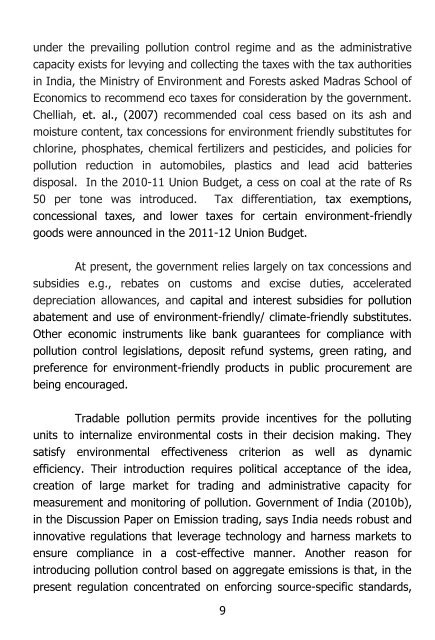
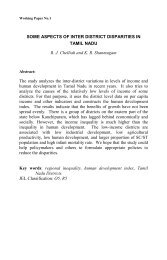

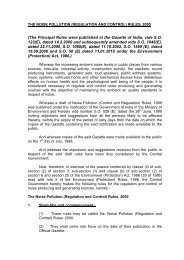
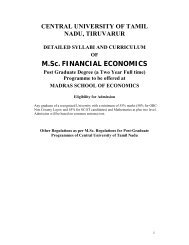
![Curriculum Vitae [pdf] - Madras School of Economics](https://img.yumpu.com/49878970/1/190x245/curriculum-vitae-pdf-madras-school-of-economics.jpg?quality=85)
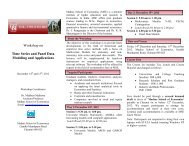
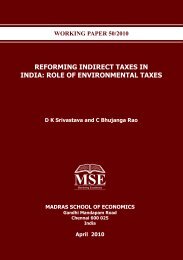
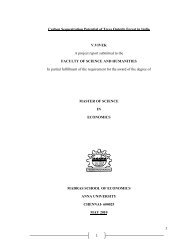
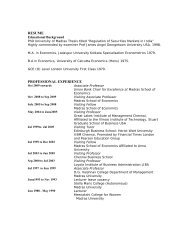
![Curriculum Vitae [pdf] - Madras School of Economics](https://img.yumpu.com/48715201/1/184x260/curriculum-vitae-pdf-madras-school-of-economics.jpg?quality=85)
